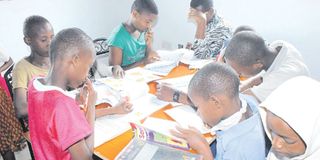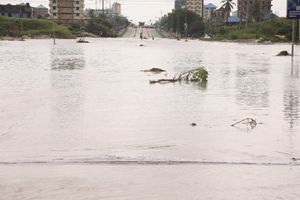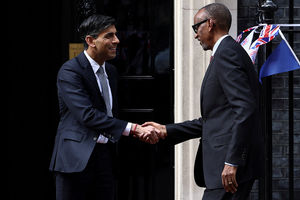What library of the future could look like

Pupils of Primary and Secondary in Arusha region reading in to Durning-O'Halloran Community Library which allocated at Engosengiu are in Sinon Ward during the launching of the library. PHOTO|FILBERT RWEYEMAMU
What you need to know:
Talented storytellers; men who could memorise or recite stories were revered and had an elevated status in society.
In ancient cultures, teaching was through oral stories.
Talented storytellers; men who could memorise or recite stories were revered and had an elevated status in society.
They had a special stool at the fireplace where stories were told.
About 500 years ago, the tide started to turn. The written word, as opposed to the spoken word, took centre stage, thanks to the printing press.
This transition started to take root when Gutenberg invented the type — that revolutionary machine that breathed life to the written word.
Using the type, the printed word spread far and wide.
The English language multiplied from 50,000 words recycled in the old English to over a million words available for use today.
The printed word birthed journalism, publishing and heralded libraries.
Authors and their work became authorities in their field. Printing presses reproduced the written word in volumes and made it easy to share, and cheap to acquire.
The 21st century has ushered in ubiquitous technologies that, like the printing press, are changing the way people obtain and read information.
In particular, technology is redefining the concept of “books” and “libraries”. Reading text on phones, computers, tablets, billboards, Kindles, smart boards, smart watches — has become common.
The old fashioned book is now in competition with gadget-delivered audio clips, provocative pictures and dazzling videos.
Nearly everyone in the world over has at least a screen that delivers information by the second.
Everyone is now a creator of content through blogs, text messages, tweets, audio and video clips.
What matters is the speed at which the content is created, curated and shared.
Whereas books were respected for carrying the truth, now, everyone trumpets their version of the truth. Online content is validated by the number of ‘likes’ and the speed at which it is shared on the Internet.
And that community is huge. Facebook, for example, has over 1.5 billion people; a community larger than any country.
This raises a number of questions. Will intellectuals slow down writing and sharing knowledge due to decreasing demand for their work?
Who will pay for the written word if books become freely available online? What will become of libraries?
Perhaps Kindles can give us a glimpse of the direction where books and libraries are headed.
Kindles allow readers to highlight sections of a book that stand out as they read. With permission, one can copy the highlighted sections into a new document.
The new document can be merged with other sections of other books written on the same subject, can be shared with other readers through social networks and be cross-referenced, compared and critiqued.
In the days ahead, it will be possible to hyperlink text that we want to cross-reference; creating a web of related materials. We can annotate it, bookmark, index, summarise, compare and contrast works by different authors.
Books will, therefore, no longer remain independent works; they will be interconnected, thanks to the Internet. They will form interlinked pieces as defined by their readers, and based on their interests.
This web of the hyperlinked texts and pages will form the new library.
A library generated for, and by readers themselves. A more democratic library, so to speak.
This Wikipedia-like approach will be fundamentally different from the practice today where, at best, books are linked through references and bibliographies.
As Kevin Kelly says in his book The Inevitable, we will come to understand that no work or idea stands alone, but that good, true and beautiful things are ecosystems of intertwined parts and related entities, past and present.
What will become of librarians? That’s a story for another day.
The writer is an informatics specialist. Email: [email protected] @samwambugu2




